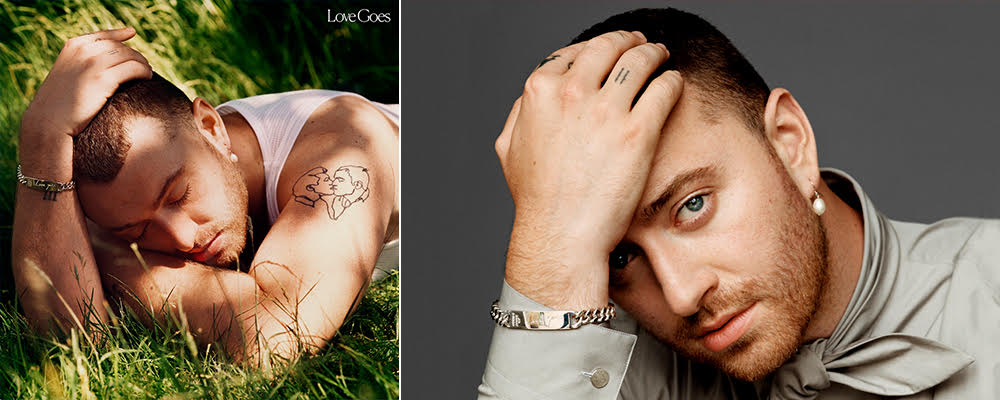Sam Smith Heals Relationship Woes With Dance Floor Therapy on ‘Love Goes’
Todd Gilchrist
It’s important to remember that even among pop music’s most preternaturally gifted, they’re still often very young — younger than their success or sophistication often indicates. With four Grammys, three Billboard awards, a Golden Globe and an Oscar under their belt, Sam Smith is just 28 years old, and even when their songwriting gifts arch into that particularly beautiful, evocative territory that registers not just musically but emotionally with a listener’s reflection, sadness, or longing, Smith hasn’t solved their problems — they’re working them out in real time too. On “Love Goes,” Smith’s latest, that vulnerability and inexperience manifests itself in a number of different ways, combining powerful admissions and sometimes treacly mantras in an act of musical self-actualization.
The question is — and the album’s impact revolves around — whether Smith’s little refrains and choruses are something they actually believe, or simply the condensed wisdom of a pop wunderkind. On “Dance (‘Til You Love Someone Else),” Smith claims “They say you can’t fall out of love” until then, which sounds terrific over a pulsing beat ready to make the song an anthem for the broken-hearted. But four decades after Gloria Gaynor’s “I Will Survive,” much less some thousands of other turn-it-around dance tracks, these are not only old ideas, they feel hopelessly trite. Lovelier are Smith’s brief gestures of escapism, when they sing about wanting to “Kiss a hundred boys and not feel like I’m tied to them,” a delicate but wonderful normalization of gender and sexuality that needs to be more commonplace in pop. But what quickly emerges from “Love Goes” is an approach that seems to prefer lamenting a past relationship, languishing in the disappointment and pain, rather than moving on. In 2020, it’s a comforting sentiment, but across 17 tracks, it grows tiresome.
By far the worst lyrics on “Love Goes” is one “So Serious,” an otherwise pretty good song that begins with the almost unforgivable “Put your hands in the air if you sometimes ever get sad like me.” For better or worse, Smith lacks the anger or even the pettiness to truly explore their romantic failures in the successful way their third cousin Lily Allen did on her debut album “Alright,” an absolute scorched-earth breakup classic. Smith is just too conciliatory, apologetic, and especially too sad. When you’re romanticizing even the fighting, as Smith does on “For the Lover That I’ve Lost,” you really do not have enough perspective to accurately assess the successes and failures in a relationship. One supposes there will be more than a handful of listeners who identify with this particularly self-indulgent kind of postmortem, but again, this is music for young people to identify with and connect to — or if you don’t fall into that category, to zone out to and enjoy its energy and musicality.
Thankfully, there are a number of terrific dance songs on the album that break up those ballads, which, as lovely as they are, tend to say a lot of the same things. Even if Smith can’t iron out their feelings on “My Oasis,” a guest verse by Nigerian artist Burna Boy adds welcome gravitas to their confusion while Swedish-Persian producer Ilya builds an unhurried midtempo groove. “Dancing With A Stranger,” which Smith released almost two years ago with Normani, strikes the best balance between the forlorn and the funky as the duo blames a lover for forcing them into the arms of someone else. Dueting with Demi Lovato on “I’m Ready,” who oversings a bit opposite Smith’s comparatively plaintive declarations, the pair deliver a trap-based power ballad that manages to offset some of the melancholy of the album’s earlier tracks. At last, tacked on as a bonus track is Calvin Harris’ “Promises,” which settles into the right, propulsive groove needed for Smith — and his fans — to move forward from heartbreak toward something more hopeful. Sadly, Smith did not include their transcendent cover of Donna Summer’s “I Feel Love,” which utilizes that exceptional register in precisely the perfect way, skyrocketing dance floors into orgiastic bliss.
Having proven with three albums, Smith is such a talented singer whose music positively oozes with feeling — and that’s kind of the problem: these songs don’t expose a raw nerve as much as they simmer in longing. When you’re in the throes of a breakup, that’s a reassuring feeling, but at a certain point, when you can articulate that hurt as precisely and vividly as Smith, there’s little excuse not to move on (except commercially, maybe). But then again, Smith is only 28, so of course these emotions feel all-consuming, and Smith has the world’s biggest microphone to talk them through. Ultimately, a handful of standards from this undoubtedly will emerge, speaking the pain of an age, and a generation, caught in their feelings at the end of a relationship without the mechanism to process them, and in lieu of an immediate replacement, not wanting to. But for the rest of us who have experienced heartbreak, rebounded, learned from it and found the strength to try again, “Love Goes” is a good album, but it really needs to go more quickly — and then grow up.
“Love Goes” releases Oct. 30 on Apple Music.

